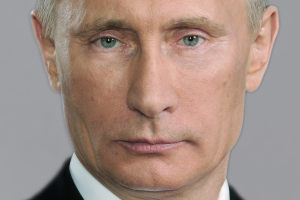Back in July, Vladimir Putin signed a law requiring all web services handling Russians’ personal data to store that information in local data centers. It was always obvious that this would be a problem for the likes of Google, Facebook and Twitter, which do not use Russian data centers – and so, it has come to pass.
On Friday, Izvestia reported that Russian telecommunications regulator Roskomnadzor has sent the three companies notification that they must register as “organizers of information”, alongside local players like VKontakte, Mail.ru andYandex. This means they must store Russians’ data locally, including metadata about Russian users’ communications.
What is more, the companies are reportedly being told to made a decision about their compliance with Russia’s bloggers’ register — Roskomnadzor may demand that bloggers with more than 3,000 regular readers join this register.
This is a full-on censorship move, as those on the register have to abide by the same restrictions as those placed on traditional broadcast and print media. These include the avoidance of “extremist calls”, hate speech, slander and obscene language. The register also compels those on it to fact-check anything they publish before doing so.
It’s not entirely clear what the impact of this would be: would the platforms themselves need to register, or would they have to police popular profiles on their platforms? Either way, if they do not comply with Roskomnadzor’s bloggers’ law and local storage demands, Google, Facebook and Twitter face fines and outright blockage in Russia.
To quote The Moscow Times’ English translation of Roskomnadzor deputy chief Maxim Ksenzov’s words: “Those three resources must make a decision about placing their data centers in Russia, and about the law on bloggers.”
The U.S. has decried Russia’s local storage mandate, arguing that the country should not use Edward Snowden’s revelations of U.S. mass surveillance as an excuse to break up the internet. This, of course, could be another effect of the law — if Russian data is stored locally and foreign web services are booted out, it becomes easier to create a separate Russian internet. It should also be noted that the Russian security services have called for Russian data centers to use locally formulated encryption algorithms, which suggests the ability for those security services to decrypt the information stored in these facilities.
I have asked Google, Facebook and Twitter what their reaction will be. So far, only Twitter has responded, declining to comment on the situation.
Back in July, Vladimir Putin signed a law requiring all web services handling Russians’ personal data to store that information in local data centers. It was always obvious that this would be a problem for the likes of Google, Facebook and Twitter, which do not use Russian data centers – and so, it has come to pass.
On Friday, Izvestia reported that Russian telecommunications regulator Roskomnadzor has sent the three companies notification that they must register as “organizers of information”, alongside local players like VKontakte, Mail.ru andYandex. This means they must store Russians’ data locally, including metadata about Russian users’ communications.
What is more, the companies are reportedly being told to made a decision about their compliance with Russia’s bloggers’ register — Roskomnadzor may demand that bloggers with more than 3,000 regular readers join this register.
This is a full-on censorship move, as those on the register have to abide by the same restrictions as those placed on traditional broadcast and print media. These include the avoidance of “extremist calls”, hate speech, slander and obscene language. The register also compels those on it to fact-check anything they publish before doing so.
It’s not entirely clear what the impact of this would be: would the platforms themselves need to register, or would they have to police popular profiles on their platforms? Either way, if they do not comply with Roskomnadzor’s bloggers’ law and local storage demands, Google, Facebook and Twitter face fines and outright blockage in Russia.
To quote The Moscow Times’ English translation of Roskomnadzor deputy chief Maxim Ksenzov’s words: “Those three resources must make a decision about placing their data centers in Russia, and about the law on bloggers.”
The U.S. has decried Russia’s local storage mandate, arguing that the country should not use Edward Snowden’s revelations of U.S. mass surveillance as an excuse to break up the internet. This, of course, could be another effect of the law — if Russian data is stored locally and foreign web services are booted out, it becomes easier to create a separate Russian internet. It should also be noted that the Russian security services have called for Russian data centers to use locally formulated encryption algorithms, which suggests the ability for those security services to decrypt the information stored in these facilities.
I have asked Google, Facebook and Twitter what their reaction will be. So far, only Twitter has responded, declining to comment on the situation.
 Yaspan Tech, Computers, Gadgets, Reviews, News and Analysis
Yaspan Tech, Computers, Gadgets, Reviews, News and Analysis





